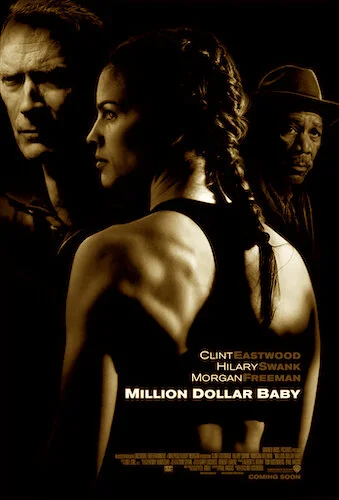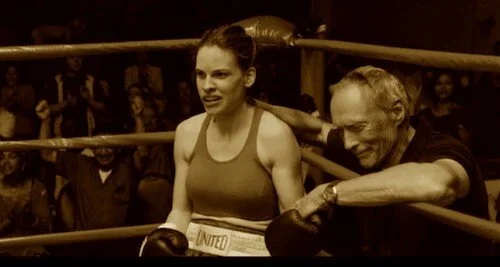Million Dollar Baby
This review is a part of the Best Picture Project: a review of every single Academy Award winner for the Best Picture category. Million Dollar Baby is the seventy seventh Best Picture winner at the 2004 Academy Awards.
One of the final films in Clint Eastwood’s golden years of filmmaking (Letters from Ewo Jima and Gran Torino mark the end of this era, for me), Million Dollar Baby encompassed many different identities when it caused a major awards season stink. It seems like Eastwood is at his best when he is reflecting on himself in some sort of way. The previous Best Picture winner of his (Unforgiven) was him making peace with the finality of his western films run (and a statement on the genre altogether). With Million Dollar Baby, Eastwood works small. Very small. Limited locations, a tiny cast, and a very brief shooting schedule (less than forty days). Million Dollar Baby encourages humility, and here was a Hollywood legend embracing mainstream minimalism.
Just like that, this film with the unique name was creating headlines, unlike any film that year. It wasn’t quite a sleeper hit (it’s not like people don’t know who Eastwood, Hilary Swank, or Morgan Freeman are), but it felt like the darling of 2004 that won the hearts of everyone. Most of this had to do with the coaxing of the unexpected. Such a small film (for a big name, anyway) was shrouded in mystery, especially when the internet was slowly becoming more important in the cinema culture. All you had to know is that this film is about a female boxer in training that won’t quit, and that the world has fallen head over heals for it. Eastwood’s ability to capture the gruffness of a weathered soul is always on display, and some of the best examples can be found here. Eastwood and Freeman (as a trainer and the trainer’s assistant) are well beyond their years, and tainted by what they have seen as well.
Maggie vows for Frankie Dunn’s consideration to train her in Million Dollar Baby.
So, a symbolic film by a master director/actor, and the world is in awe. What could go wrong? Well, Million Dollar Baby is one of the pivotal films when it comes to the shaping of the internet when dealing with cinema. It has been fifteen years, but you likely know that Million Dollar Baby contains a twist. It’s the kind of twist that changes the entire perception of the film, and you likely won’t know what is about to happen when it does. Of course, citizens of the information super highway didn’t know how to deal with this, and spoilers were slapped across the face of the communal database. That’s it. Because of the hype surrounding Million Dollar Baby, many people, I guess, wanted to prove that they were a part of this phenomenon. Thus, discussions were had wide out in the open. Websites like IMDb and Rotten Tomatoes had to rethink their forum spaces and structure. The whole point was to encourage people to see films like this, not ruin the narrative and have them stay home.
That didn’t stop Million Dollar Baby, luckily. The film, like its eager main character Maggie (played with such honesty by Hilary Swank), never gave up, and fought to get to its Best Picture spot. Disguised as a sports drama, Million Dollar Baby is actually about the acceptance of one in an unresponsive society, as well as what it means to nurture someone and love them (platonically, of course). This is no clearer than the “second wave” of the film, when everything changes. Since the film operates on a more humanistic level, all of its progressions feel genuine and easy to be involved with. You root, because you are seeing an everyday woman in a film made for everyday people. There’s no glitz, glamour, or lies to your face. Hell, Maggie barely gets this opportunity, and has to fight to prove her worth to a world that won’t give her the time of day.
Maggie living her dream as a boxer.
After all is said and done, Million Dollar Baby even ends small. Recent Eastwood films (the earliest example for me is Invictus) don’t really know how to conclude themselves. It’s as it Eastwood loves to tell scenarios (and does so at a prolific pace), but not full on stories that wrap up properly. Well, Million Dollar Baby is an example of Eastwood knowing the perfect way to finish a powerful, moving tale without needing a big bang. Like the rest of the picture, Million Dollar Baby eases you back into reality with all that you need to know. Like the voices of the main characters here, that most of the world couldn’t care less about, the film speaks exactly what it needs to say, and leaves you alone shyly. That could be why the film succeeded even with the deadly spoilers. Million Dollar Baby is unassuming, but tough. Charming, but grim. Rusty, but well made.
The way people read up (or posted) about films had to change, because we couldn’t keep ruining great films for others. As for the Academy, luckily this cyber faux pas did not slow down the poetic sports drama that dominated its year. It may not have been as creative as Eternal Sunshine of the Spotless Mind, as nihilistically hysterical as Sideways, or as ambitious as The Aviator. It didn’t need to be. Its introverted ways contrasted an industry that was now working bigger than ever in all ways. It’s easy to see the appeal, world wide and critically.
Andreas Babiolakis has a Masters degree in Film and Photography Preservation and Collections Management from Ryerson University, as well as a Bachelors degree in Cinema Studies from York University. His favourite times of year are the Criterion Collection flash sales and the annual Toronto International Film Festival.







